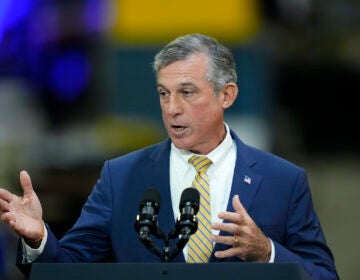Carper easily defeats progressive challenger in Senate primary
Tom Carper retains his title as the winningest statewide elected official in state history. He secured 65 percent of the vote over progressive challenger Kerri Evelyn Harris.

United States Senator Tom Carper (right) greets Governor John Carney during a Primary Election gathering Thursday, Sept. 06, 2018, at Frawley Stadium in Wilmington, Delaware. (Saquan Stimpson/for WHYY)
Tom Carper, the winningest statewide politician in Delaware history, continued his streak of victories Tuesday by trouncing progressive challenger Kerri Evelyn Harris in the Democratic primary for U.S. Senate.
In a primary election that featured a busy slate of races for statewide and local offices, the premier contest was the seat that centrist Carper has held since in 2001. Carper, who took 65 percent of the vote, will now face Sussex County Councilman Rob Arlett in the Nov. 6 general election.
Arlett took 67 percent of the vote, with businessman Gene Truono taking 28 percent. Out-of-stater Rocky de la Fuente managed to get 5 percent.
You can find full results at the state Department of Elections website.
Carper told supporters gathered inside Frawley Stadium in Wilmington not to get complacent. “This is not the finish line. This is a good, solid win,” Carper said. He urged Democrats to come together. “We need to unite as a party. We need to keep in mind that we are not one another’s enemies, we share the same values.”

The race drew national attention following the upset win of progressive candidates like Alexandria Ocasio Cortez in New York. Harris hoped to change Delaware, pushing the state Democratic party more to the left and remove Carper from the seat he’s held for three terms. But change is not what Democratic primary voters picked.
Harris said the Democratic Party needs more progressive voices representing the people. “If they do not we are going to lose more and more seats … If the Democratic Party does not shift back to the people we are not going to continue to win. We should not shy away from new voices, we should make it clear we need diversity and that will make us stronger.”
The Harris campaign was counting on driving new voters to the polls, calculating that the race would be close if 50,000 voters took part in the Democratic primary. But even with more than 78,000 voters, Harris was easily defeated. Four years ago, in the last midterm election, only 22,000 Democratic voters- just 7 percent- showed up to vote in the primary.
Harris took some solace in being able to drive big numbers of voters to the polls. “We have brought out more people than we’ve seen in the last 30 years to the polls in Delaware. We’ve made a message resonate across the nation, we’ve made it clear to the people of Delaware it’s okay to take a chance for change,” Harris said.
This race drew comparisons to the 2010 Senate primary race on the Republican side that saw longtime Delaware Congressman Mike Castle stunningly upset by Christine O’Donnell, an unknown political newcomer who rode a Tea Party wave of change for the Republican party. Unlike Castle, who never engaged O’Donnell in debate or really recognized her challenge, Carper has actively campaigned against Harris, even agreeing to a rare primary debate. That effort paid off as Carper nearly doubled his opponent’s raw vote total, gathering 53,633 to 29,406 for Harris.
Carper’s campaign vastly outraised and outspent Harris, who eschewed corporate PAC donations and criticized Carper for accepting so much money from corporations. “The truth is I was priced out because our current system prices out the working class person. we have to change campaign finance to make sure all of us have a voice and until we do so we will have these uphill battles,” Harris said.
Looking ahead to November, Carper will face Arlett who ran President Trump’s Delaware campaign. Carper often says he campaigns as if he’s 20 points behind and his opponent is ten feet tall. He’ll approach the general election campaign the same way. “Just work like hell, that’s all I’ve ever done. And stay close to Delaware.”
Voters will return to the polls on November 6.
WHYY is your source for fact-based, in-depth journalism and information. As a nonprofit organization, we rely on financial support from readers like you. Please give today.






